Landfills are seeing PFAS show up in their leachate around the country. As these levels rise, they may no longer be able to send this leachate to their local POTW without first removing the PFAS. Leachate represents a particular challenge due to the cacophony of different contaminants ranging from BOD, COD to Ammonia and other nitrogen compounds, and a LOT of TSS and TDS that make up typical leachate.
One Massachusetts solid waste authority was no longer able to send their leachate to their local wastewater authority due to increasing levels of PFAS in the leachate. The additional cost and transit time to take the leachate elsewhere is significant and immediately created issues for the landfill.
The engineering firm for the authority reached out to CETCO and Theia Water for a potential solution. They asked an important question. “Can Fluoro-Sorb media remove PFAS without having to do substantial pretreatment?”
- The large organic content in leachate would render carbon useless in short order. Similarly the significant TDS loading rules out the use of Ion Exchange Resins.

Theia Water was asked to build a pilot system to find out. The goal was to verify the efficacy of the treatment while also treating sufficient leachate to keep up with the landfill’s daily production.
Theia built a 25 gpm treatment system in one of our pilot system enclosures. The system included a two -stage filtration system which was based on the preliminary solids testing performed on the leachate by the engineer. The primary filtration consisted of an automated disc filter with 10 micron discs. This was followed by a duplex cartridge filter system with 1 micron discs.


The PFAS treatment component consists of a series arrangement of TW – 2460HPL fiberglass treatment adsorbers. Each Adsorber contains TW-FS400 plus media.
The system also included flow meters, pressure measurement and pump controls. It was designed to integrate with the customer influent and effluent tanks. The system enclosure is heated and insulated with lights and outlets.
The system was started up in October 2020 and has been running since. Thus far, the system has effectively removed the significant majority of the PFAS compounds and meeting discharge criteria. The solids have turned out to be a bit more of a challenge and Theia is presently evaluating alternatives for the prefiltration system with the engineer.
